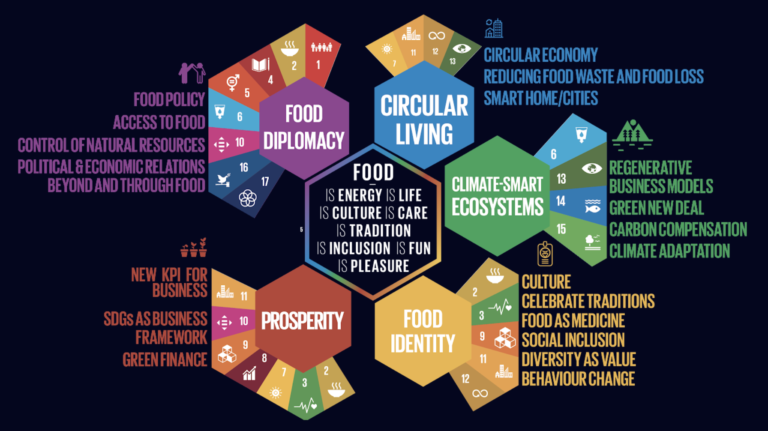
Food for Earth
Future Food Institute has developed a framework, in partnership with FAO, that connects the existing environmental solution innovations. This Toolbox allows different stakeholders to apply best practices to five thematic areas:
Food Diplomacy, Prosperity, Circular Living, Food identity, and Climate-smart Ecosystems.
DIPLOMACY
Food as it relates to national and international relations, just as in diplomatic practice. It can be a means of exerting influence and of communicating one’s culture and identity. Food Diplomacy is also a key discipline in managing access to safe food and water and the impacts that environmental disasters are having on agriculture, causing an increasing number of climate migrants.
CIRCULAR LIVING
In this area, food is considered within the domestic dimension. Circular Living is an innovative approach aimed at eliminating waste (food waste, water waste, and soil depletion / erosion) through regenerative food practices and continuous resource management. By focusing on increasing efficiency, waste outputs are converted into useful inputs, minimizing resource loss.

CLIMATE-SMART ECOSYSTEMS
Food as it relates to the natural environment. A smart approach to climate facilitates adaptation and mitigation strategies, moving from an intensive approach to one of a low-impact. With the help of technology, it is possible to improve realities and geographical areas hit by environmental distress to be food self-sufficient.
FOOD IDENTITY
In this area, food is considered within its community dimension. Food traditions, cultural aspects, and rituals are an essential part of planetary and social regeneration, passing through food identities. Food identities provide a representation of the richness and cultural diversity that exists in a city’s food and social landscape. The interaction of different food identities determines the overall culture of the places where Humana Communitas reside.
Food as an economic driver. Prosperity is not isolated from financial gain but includes critical elements including emotional, physical, mental, and cultural prosperity. Our understanding of prosperity must change and develop to include all necessary facets, encouraging responsible, collective, and participatory decisions to prosper together. This new integrated approach to prosperity also leads to rethinking the indicators and generators of well-being that analyze how nutrition and nutrition generate prosperity.
